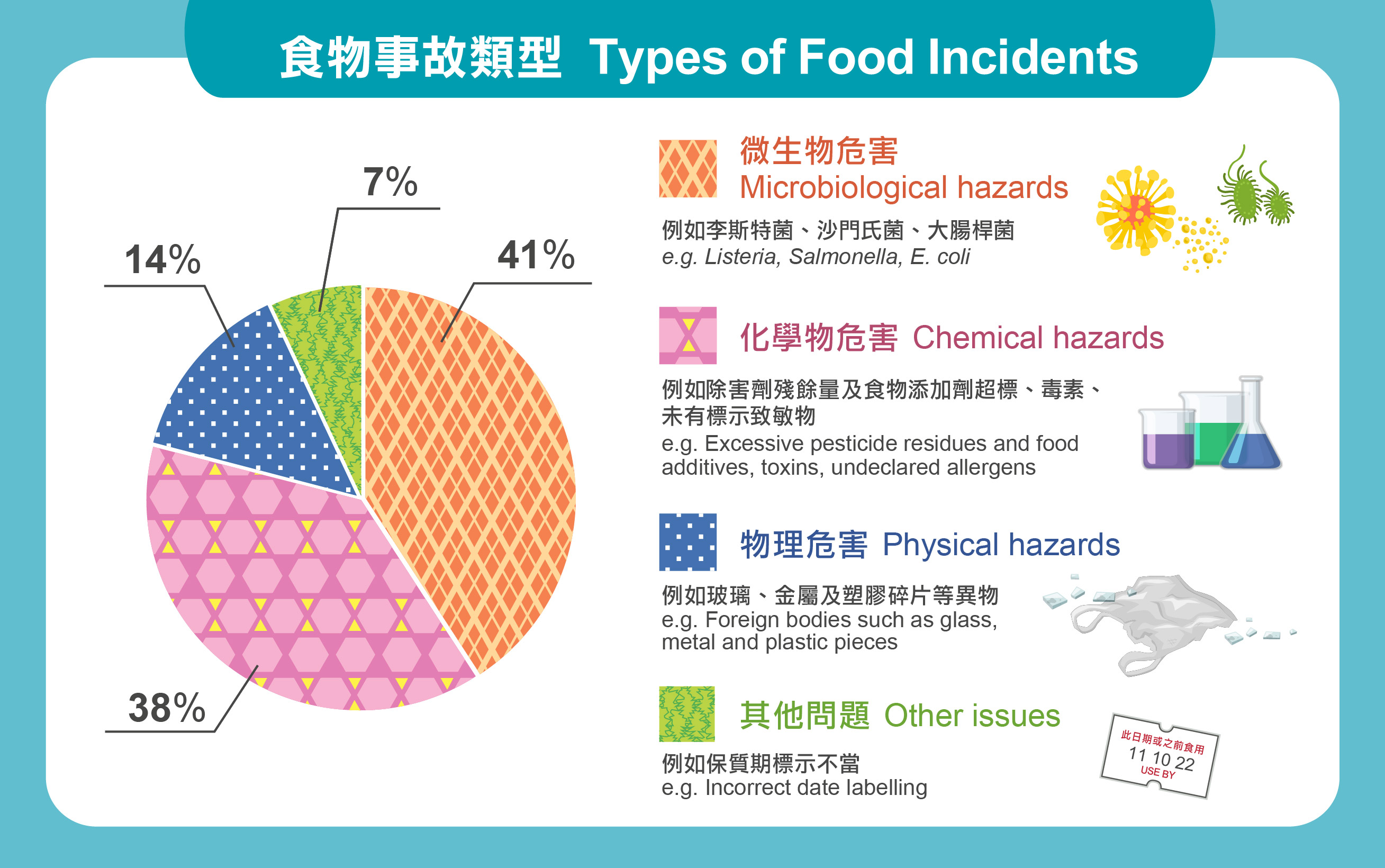
Food Safety Focus (199th Issue, February 2023)– Article 1
Review of Food Incidents in 2022
Reported by Dr. Yu-ching LI, Medical & Health Officer,
Risk Management Section, Centre for Food Safety
The Centre for Food Safety (CFS) has established the Food Incidents Surveillance System (FISS) to proactively monitor food incidents occurring outside Hong Kong and take swift risk management actions to protect local public health. The CFS also participates in international food safety networks such as the International Food Safety Authorities Network (INFOSAN), and the European Union's Rapid Alert System for Food and Feed (RASFF) to enhance collaboration with other food safety authorities.
Food Incidents in 2022
The CFS detected around 2 500 food incidents from the FISS in 2022. In response to those food incidents having potential local impact, the CFS assessed the risk and investigated the local availability of the products in question by reviewing relevant import records, liaising with relevant authorities and conducting sales checks with local traders. Depending on the risk assessment and the scale of the local impact, the CFS developed various risk management actions, including discontinuing the sale of concerned products, product recall, enhanced surveillance and import suspension.
Through various public announcement channels, the CFS informed the public about the food incidents and provided food safety advice. When local sale was identified and product recall was required, the CFS notified consumers and food business via press release, trade alert, and food/allergy alert. When the impacted products were not available locally, the CFS released a food incident post instead to alert the public.
In 2022, the CFS issued 349 food incident posts, 25 press releases, 26 trade alerts, and 22 food alerts/allergy alerts, involving chemical hazards (e.g. excessive pesticide residues and food additives, toxins, undeclared allergens), microbiological hazards (e.g. Listeria, Salmonella, E. coli), physical hazards (e.g. foreign bodies), and other issues (e.g. incorrect date labelling). The majority of the food incidents with public announcements made were related to microbiological and chemical hazards, which accounted for 41% and 38% respectively. (Figure 1).

Figure 1: Types of food incidents with public announcements made in 2022
Risk Management of Food Incidents
The following examples that occurred in 2022 illustrate how the CFS detects food incidents through the FISS, formulates effective risk management strategies and implement appropriate control measures.
Chocolate products with possible Salmonella contamination
Through the FISS, the CFS identified notices issued by food safety authorities in early April 2022 regarding recall of certain batches of a brand of chocolate products due to possible link to an outbreak of Salmonella infections. The CFS immediately contacted the authorities concerned and the INFOSAN, an international network of food safety authorities, to obtain more information about the incident. The CFS followed up with the trade and identified local import and sale of the affected products in Hong Kong. The CFS instructed the importers to recall the affected products, and issued press release and trade alert promptly. Moreover, the CFS enhanced surveillance on chocolate products of the same brand.
The INFOSAN later issued a related alert regarding a global recall of the concerned brand of chocolate products produced in a factory in Belgium, which were linked to a multi-country outbreak of Salmonella with over a hundred cases reported from various countries. The CFS continued to monitor the latest development through the FISS. As the incident evolved with increasing number of products being recalled globally, the CFS informed the public and the trade about the latest situation. There were no reports of local cases of Salmonella food poisoning associated with the consumption of the affected products.
Ice cream products with possible presence of ethylene oxide
In June 2022, through the FISS, the CFS identified an announcement from a food safety authority regarding a certain brand of ice cream products from Europe detected with a pesticide, ethylene oxide (EO). Subsequently, the CFS received a notification from RASFF that other kinds of ice cream of the same brand found to contain EO had been distributed to Hong Kong.
The International Agency for Research on Cancer classified EO as carcinogenic to humans (Group 1). The CFS immediately liaised with the authorities concerned and the trade for follow-up. Through press releases and trade alerts, the CFS urged the importer to initiate a recall, advised the public not to consume, and instructed the trade not to sell the implicated items. The CFS also stepped up surveillance on the same brand of ice cream.
Conclusion
The CFS strives to safeguard public health by responding quickly to food incidents through early detection and intervention. To ensure local food safety, the FISS is a tool used by the CFS to detect and respond quickly to food incidents.

